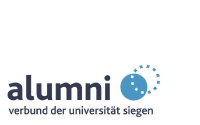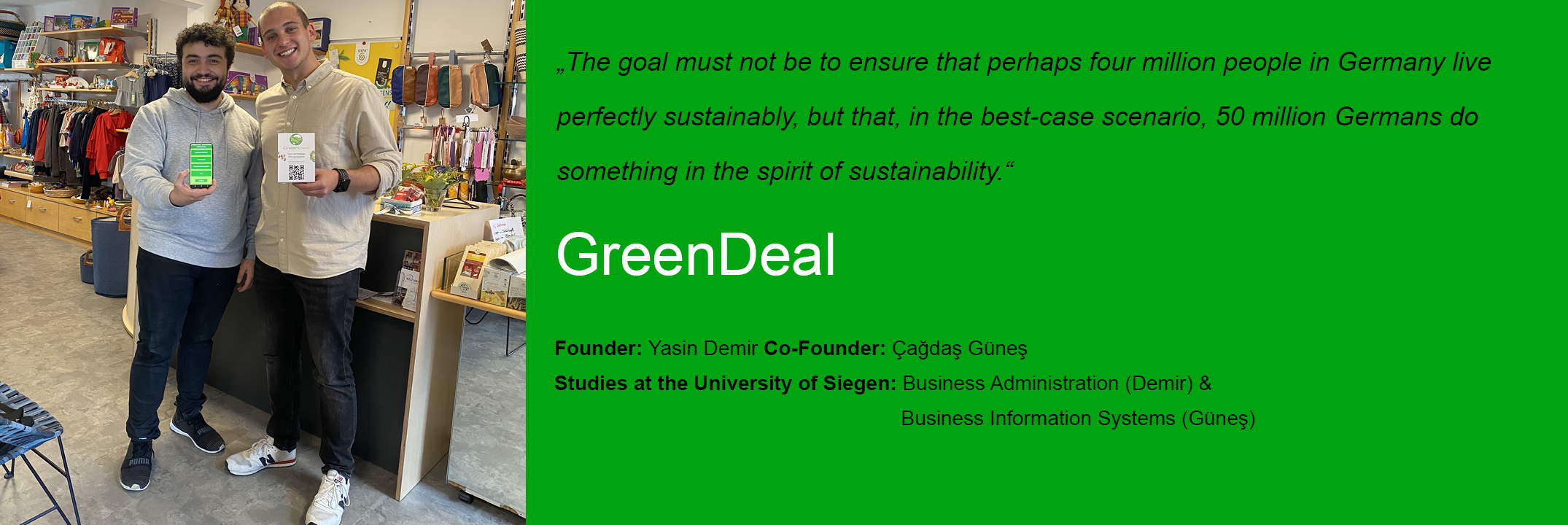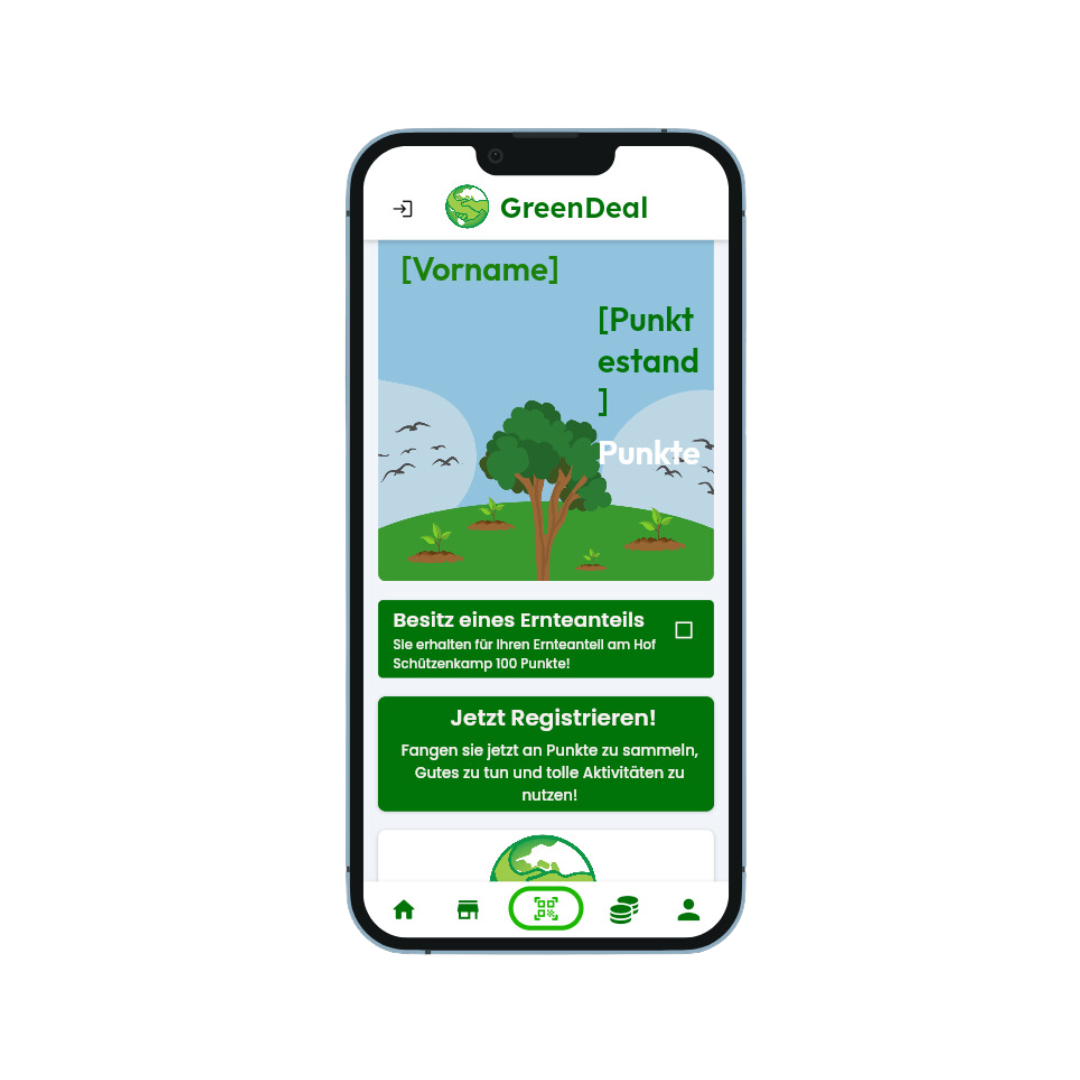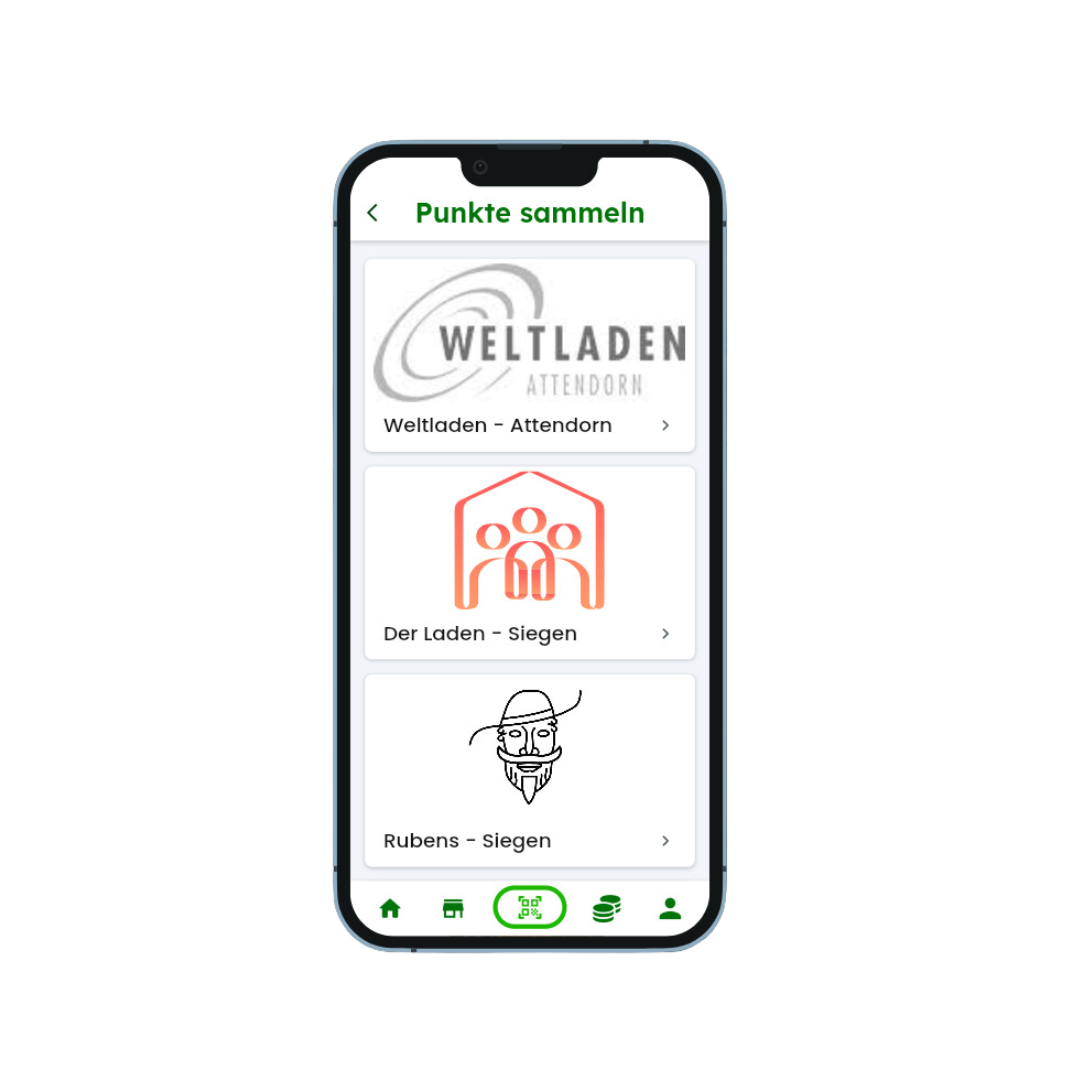GreenDeal
25-year-old Yasin Demir from Attendorn is the founder of GreenDeal, an app that rewards environmentally conscious people in an amusing way. Together with his co-founder Çağdaş Güneş, they are helping to promote environmentally friendly shopping behaviour among shoppers.
What is GreenDeal?
Green Deal is the sustainable bonus programme. With the Green Deal app, we offer shoppers the opportunity to collect points for sustainable shopping or for shopping in sustainable shops. They can exchange these points for regional leisure activities or donate them to local non-profit organisations. On the one hand, it was important to us to incentivise local shopping, especially sustainable shopping. This is our top priority because we want to encourage more people to make a contribution to environmental protection. On the other hand, we have deliberately decided that the points should be redeemed locally in the region. We always follow the motto: From the region, for the region. This means that the points should be spent on local leisure activities or donated to local non-profit organisations in order to create a points cycle within the region.
What is special about GreenDeal?
Our value proposition is somewhere special. We definitely want to make a contribution to environmental protection, sustainability and social issues in general. We are in a position to ensure greater visibility for regional shops and regional social commitment. This is very special because there is a lot of room for improvement when it comes to the visibility of regional, sustainable retail. A small example: If you google sustainable shopping in Siegen, the third entry is City-Galerie. However, sustainable shopping is something else. What makes us special is that you can redeem points for local leisure activities. These activities and sustainable shopping remain in our minds.
What activities can the sustainable buyer look forward to?
The bonus programme includes the South Sauerland Museum, stand-up paddling, other museums, escape rooms, and outdoor pools are to be added soon - in other words, everything that the locality has to offer.
How did you come up with the idea of founding "Greendeal"?
I became interested in the topic of environmental protection when I realised how polluted the world's oceans are. I found it shocking how much plastic was floating in the world's oceans. At some point over dinner with my father, I came up with the idea of incentivising sustainable shopping. How would that be possible? They came up with the idea that you could collect points for sustainable shopping. I took the idea to the start-up office at the University of Siegen, which is now the university's Entrepreneurship Centre. They then worked out the idea of rewarding sustainable shopping with an app. Then there was the question of what you could get for collecting points. Others do it so that you get consumer goods in return, the next toaster, the next blender. For us, however, it should be something special and so the idea came up that it could be leisure activities. You go to a leisure activity that you enjoy free of charge, have a lot of fun - you then combine this with sustainable shopping and are willing to go shopping sustainably. That sounded like a great concept, which I then continued to work on and applied for the NRW start-up grant relatively quickly. During the course of my studies, when it came to the app, I got to know my co-founder, Çağdaş Güneş, who I then brought on board. He has an IT background and was keen to work on the app.
Did you believe from the start that you could generate revenue with this app?
This is a sensitive issue. We don't generate any revenue that would allow us to make a living from it, but are still dependent on funding from the Federal Ministry of Education and Research. We have applied for funding from the BMBF totalling €175,000. It depends on whether we can really do this full-time. If we receive the funding, we have a tight schedule or a funding period of twelve months and after these twelve months the project should be able to pay for itself. I believed from the outset that the idea was destined for something big and that we could achieve something with it.
Have you always wanted to be self-employed?
No, not really. It was never plan A to become self-employed. I always intended to work in human resources at some point. The path was certain for me until this idea came up at some point and I got in touch with the start-up office and continued to work on this idea. That's how the path turned out.
What hurdles were there when the company was founded?
Firstly, in the development of the app. The question arose as to whether to commission someone, which would have cost an incredible amount of money. We were talking about sums of between 25 and 100,000 euros, which we didn't have. Instead, we developed the app completely on our own, without any service providers. The next hurdle was distribution. We had an idea of the bonus programme. We were sure that we could do something good with it. This idea then had to be pitched to partners, organic food shops, farm shops and leisure activities. When you first received a rejection and nobody was interested in your project or had confidence in your product, it was tough because you had an image of your own idea, which was initially outstanding. You think to yourself that everyone wins with this project; no one suffers, everyone actually has to take part because there is no argument against it. It also took us a very long time to find our first partners. That was a very big hurdle that took a bit of a toll on us mentally. But at the end of the day, we have grown as a result.
What worked particularly well?
Once we got our foot in the door and had our first partners, we built up a strong network of different partners. That went really well. Even in the test phases, which we are actually still in, the product has been pretty well received. In other words, we see shops where the product is used on a daily basis. We want to build on that. I'm very happy with that. Although none of us had any knowledge of how to programme an app, we have mastered the implementation of the app and the database very well. I'm really proud of that.
What motivated you to believe in your idea during the time when there were these hurdles?
I have to say a big thank you to the coaches we received from the Entrepreneurship Centre because they prepared and supported us along the way. We are in constant dialogue. We now have a weekly meeting where we discuss everything. The coaches from the Entrepreneurship Centre have motivated us to keep our heads up. This exchange reminded me why I was doing this and helped me to keep believing in my idea. Until the first successes came.
What do you like most about your job?
On the one hand, it's nice to be independent. But what I like most is the lively exchange. You're constantly in dialogue with partners. You talk to people who are interested in environmental protection, who use the app, with shops that offer the app and you always get to know new people and get new input and new points of view. This means that you're not just programming an app or planning the marketing, but are always in dialogue with other start-ups, which I find really interesting. This makes the work very varied.
What does a normal working day look like for you?
Getting up early. I've usually already prepared a to-do list of everything that needs to be done in the evening. I then liaise with my co-founder about how the IT projects are going and think about how we can achieve more in the area of marketing and plan further projects to help our partners achieve greater reach. That is our goal. We want to generate more reach for the shops, because that's how we generate reach for the app, of course. We also want to draw attention to what sustainable shopping looks like. At the moment, that's what we're most concerned with and takes up most of our time. We are also looking after sales and finding new partners in the Siegen Wittgenstein area and the Olpe district. My co-founder Çağdaş mainly takes care of the website and the functionality and further development of the app.
Which seminars at the University of Siegen have proven useful for your start-up?
Of course, your studies have already given you a good general overview of the topic of self-employment and everything that goes with it. That means you have a bit of an idea of accounting and are also familiar with company forms. One module that sticks in my mind is a seminar with Robert Kebbekus.
What support services have helped you?
There were always workshops at the Entrepreneurship Centre that I found very interesting and that went into great detail. Financing workshops for start-ups are offered there and there is pitch training, which is particularly important when it comes to storytelling. The sales workshop, for example, helped us to learn a lot on the one hand and on the other, it reignited our enthusiasm for our own idea. We also had a seminar over two or three days, which was a bit about personal development. I also found that very helpful. Apart from that, Startpunkt 57 always organises good events, which we make use of. Then, of course, there are the coaches provided by the university's Entrepreneurship Centre, which is an absolute blessing for me. The networking events are also very important because you always get to know people who can help you with problems.
What would you recommend to people who are not familiar with the topic of sustainability?
People who are not familiar with the topic of sustainability believe that if they want to live sustainably, they have to change their lifestyle completely, which means they have to give up meat, they only have to shop in organic food shops, they are not allowed to drive a car, they are not allowed to do this and that. As if that would only involve bans, but that's not the case. You can make a contribution to sustainability if you think about the issue a little and decide to buy pasta or organic goods without packaging. When I buy a product without packaging, I avoid a lot of waste and the aim must not be to ensure that perhaps four million people in Germany live a perfectly sustainable life, but that, in the best case scenario, 50 million Germans do something to promote sustainability. If everyone makes a small contribution and decides to buy goods without packaging or from an organic or farm shop, you are already doing a lot to protect the environment, even if you don't realise it.
How can everyone simply contribute to living in a more environmentally friendly and sustainable way?
You're already making a big contribution if you leave the car behind for short journeys, for example, and it's good to get some fresh air, especially in summer. Another option would be to simply pop into a shop, be it an organic or farm shop, or even a second-hand store. You can also simply skip the plastic bag when buying fruit or vegetables and take your own jute bag to the shops instead. It really isn't a Herculean task.
What tips would you give future founders?
It is always a good idea to contact a start-up advice centre, because they can always provide support, be it with workshops, seminars, coaches or through a network. The network is particularly helpful for keeping in touch with other start-ups - especially at networking events, because only then can you get to know people who can help you. You are never completely alone with problems if you have a network. You know someone who knows someone who can help you, which is very important. And even if the road is tough at times, if you believe in the idea, you should keep going.
This portrait is based on an interview with Yasin Demir in May 2024 and was written by Duygu Cicek.
Here to the homepage of the start-up




